
Every young person has to make life-changing decisions about their sexual and reproductive health. However many of them cannot access clear, evidence-based information. IPPF's comprehensive sexuality education programmes enable young people to make informed decisions about their sexuality and health, while building life skills and promoting gender equality.
Articles by Comprehensive Sex Education

European Commission's new Women's Rights Roadmap includes SRHR—Now we need action
On 7 March 2025, the European Commission released its new Roadmap for Women’s Rights - a political declaration that reaffirms its determination to uphold gender equality and sets out a long-term vision for how it will advance women’s rights. IPPF EN welcomes this crucial commitment at a time when ultraconservative movements are gaining influence in the EU and around the world, threatening progress on women's rights, including their sexual and reproductive health and rights (SRHR). We particularly value the inclusion in the Roadmap of the following key commitments, which are at the heart of our demands to the EU: 1. Highest Standards of Health The Roadmap reiterates that every woman has the right to the highest attainable standards of physical and mental health, with notably a focus on SRHR. It commits to supporting and complementing health action by Member States in this field, in full respect of the Treaties. IPPF EN strongly supports this inclusion of SRHR in the Roadmap, by which the European Commission highlights that SRHR are women’s rights and part of EU values. But it is important to note that SRHR are not only a health issue – they are also fundamental rights intertwined with the clear EU priorities of achieving gender equality and fighting against sexual and gender-based violence. We urge the EU to take bold, actionable steps in the upcoming Gender Equality Strategy to implement international commitments, international human rights and public health standards on SRHR, and ensure that Member States guarantee access to comprehensive SRHR services for all in the EU, including safe and legal abortion. Other objectives in the Roadmap include ensuring respectful and high quality obstetric, gynaecological, antenatal, childbirth and postnatal care, free from discrimination and harmful practices; promoting gender-sensitive medical research, clinical trials, diagnostics and treatments; and ensuring access to affordable menstrual hygiene products and contraception. IPPF EN welcomes the prioritisation of obstetric care, of which access to abortion care is an integral part; and calls for the recognition and combating of all forms of obstetric and gynaecological violence, including mistreatment during and denial of abortion care. 2. Freedom from Gender-Based Violence The Roadmap outlines actions to combat all forms of violence against women and girls, including sexual violence and rape, based on lack of consent, and to ensure support and protection for victims of violence. IPPF EN urges Member States to provide access to sexual and reproductive healthcare services to victims of sexual violence, which should be free of charge, sufficiently resourced and accessible at all times and throughout the country, in line with the EU Directive on Violence Against Women. 3. Comprehensive Sexuality Education We strongly welcome the inclusion of comprehensive sexuality education promotion in the Roadmap. Comprehensive sexuality education, which includes consent education, is essential for enabling young people to form happy, healthy, and safe relationships free from violence and discrimination. 4. Institutional Mechanisms and Funding The Roadmap stresses the need for strong institutional mechanisms and sustainable funding for gender equality policies and women’s rights organisations. IPPF EN calls for the priorities outlined in the Roadmap, and the forthcoming Gender Equality Strategy, to be adequately funded, particularly in light of the upcoming negotiations on the EU Multiannual Financial Framework. A strong women’s rights movement is the most effective way to counter threats of retrogression. The EU should increase its protection and political and financial support to organisations and human rights defenders who fight for women’s rights, including SRHR. 5. Intersectionality The Roadmap recognizes the importance of addressing intersectional discrimination, but we regret the omission of ‘gender identity’, ‘sexual characteristics’, and ‘migration status’ as discrimination grounds. We call on the EU to address the specific needs of trans, non-binary, intersex, and migrant and undocumented women, who face unique challenges. “It is a welcome first step that SRHR and other crucial topics have been included in the Roadmap for Women’s Rights. The Roadmap should now pave the way for the new EU Gender Equality Strategy post-2025 and be followed up with impactful actions. We stand ready to work with the European Commission and Member States to transform these principles into reality,” said Micah Grzywnowicz, IPPF EN Regional Director. Image credit: Fátima Bravo for Fine Acts
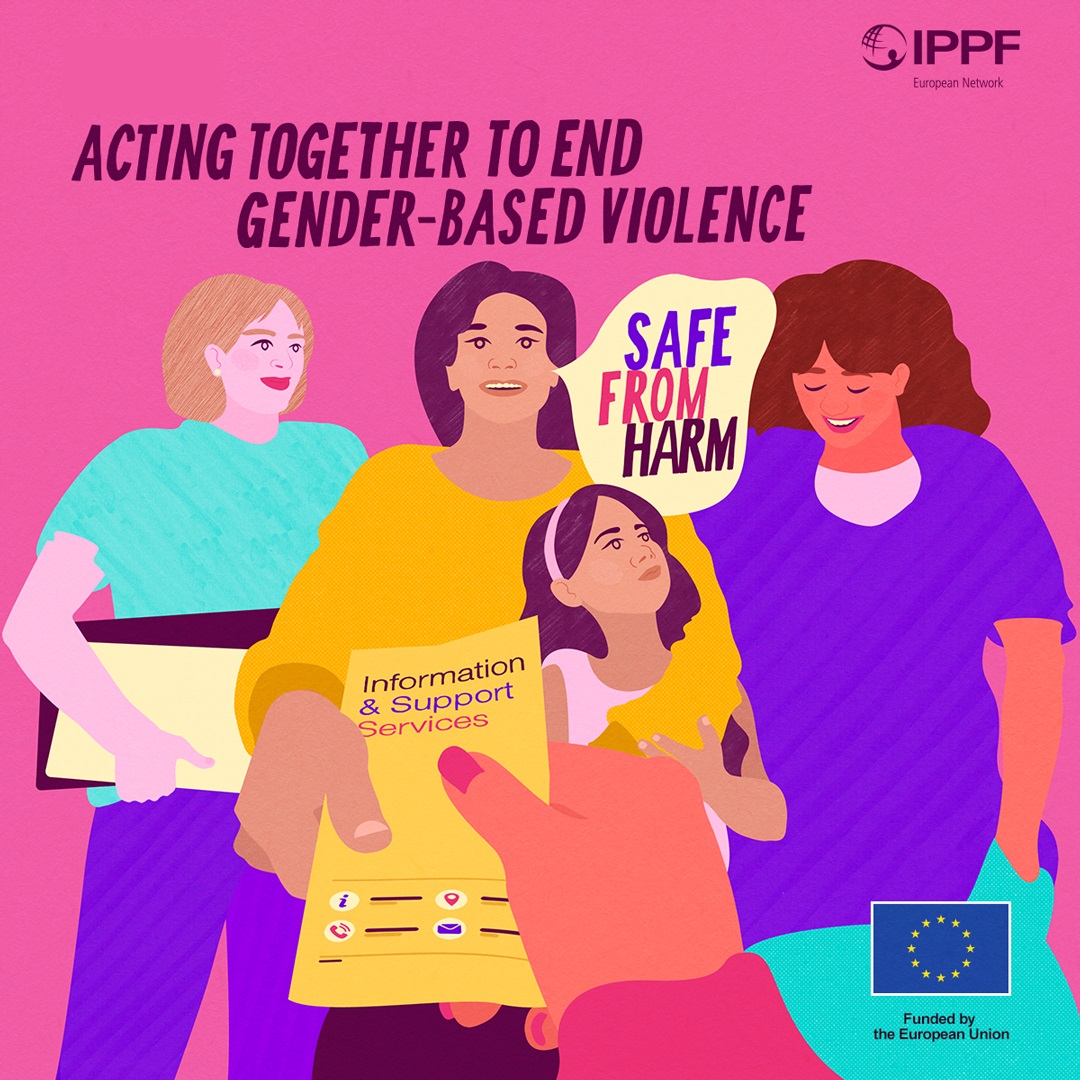
EU fails to criminalise rape but strengthens prevention measures and support services for survivors
Yesterday, the European Parliament and Member States reached a hard-won agreement on the Directive on combating violence against women and domestic violence. IPPF EN welcomes this first ever binding EU legislation on combating violence against women. But we regret that, while the Directive contains positive measures, the final text is incomplete and represents a serious missed opportunity to ensure protection from all forms of gender-based violence for all people. It is outrageous and deeply disappointing that lack of political will from national governments, notably France and Germany, has resulted in a final text that does not tackle the scourge of sexual violence, in spite of bold efforts from the European Commission and Parliament.
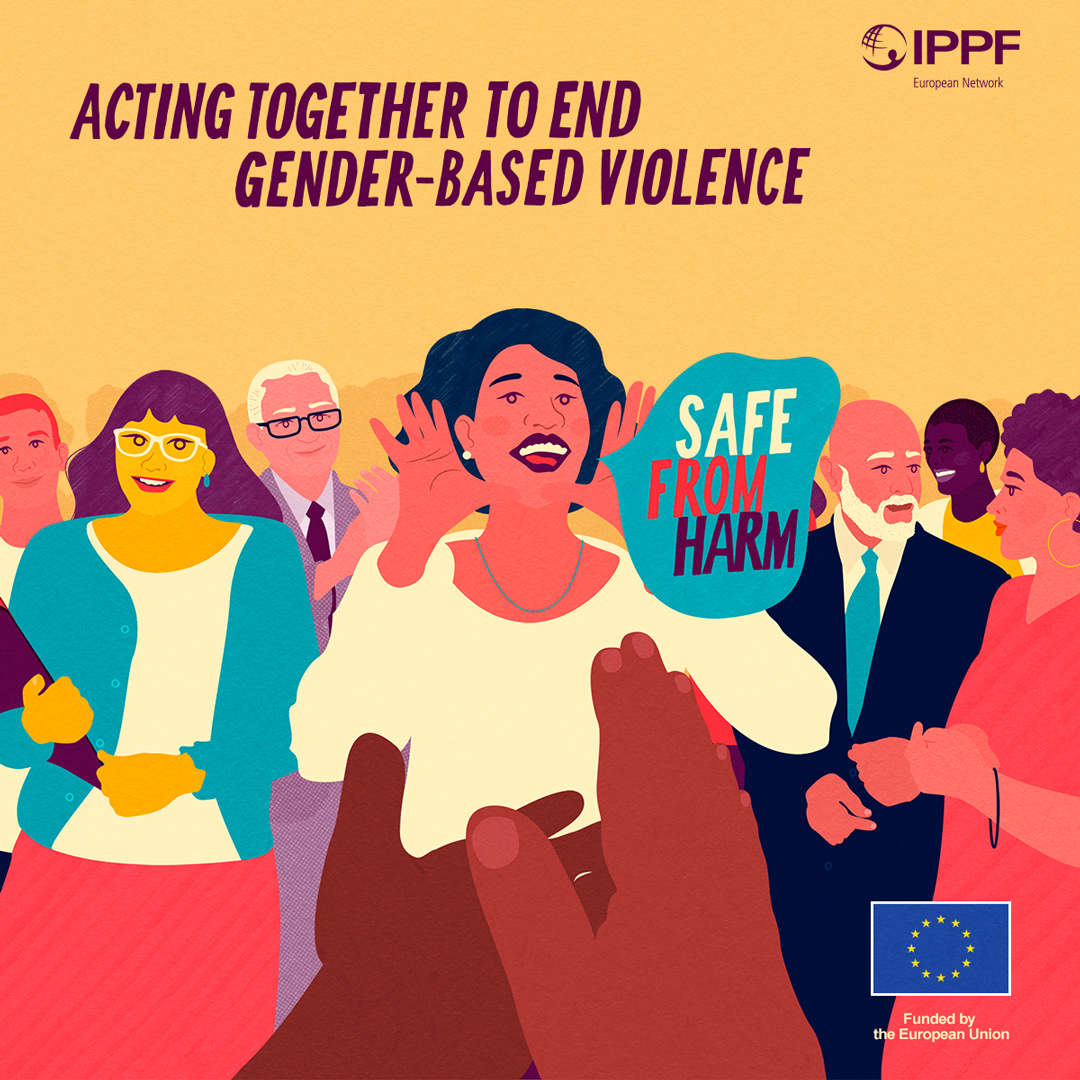
Civil society calls for a robust EU Directive on violence against women and domestic violence
On 24 January, as final negotiations on the EU Directive on combating violence against women and domestic violence are taking place, IPPF EN and 11 other NGOs called on negotiators to take effective action and ensure that a robust Directive is urgently adopted. An open letter to negotiators in the Belgian Presidency of the Council of the European Union, Member States, the European Parliament and the European Commission ahead of the final negotiations of this mandate on the Directive on combating violence against women and domestic violence (COM (2022) 105 final, 8 March 2022) We are writing as concerned organisations[1] that advocate for human rights, gender equality, and the right for all to live free from violence. As we have entered the final weeks of European Union institutions’ ability to negotiate legislative files before the next European elections, we call on European governments to level up and take effective action to combat violence against women and domestic violence by urgently adopting a robust Directive. We welcome this proposed Directive, as it provides much needed comprehensive responses, incorporating prevention, protection, support for victims and prosecution for a range of criminal offences which constitute violence against women and domestic violence. The adoption of this Directive is, however, endangered due to several Member States’ failure to agree to strengthen laws and policies at the EU level and endorse crucial measures supported by the European Commission and the European Parliament, as well as by diverse civil society organisations across Europe. If agreement is not reached in the next weeks, there are serious risks of this proposal being further weakened or not adopted at all under the next mandate of the European Parliament. This would leave women and other people affected across the EU without adequate protection from gender-based and domestic violence. We urge national governments to transform lip service to ending violence against women into concrete and effective action against this scourge that affects millions in the EU, including by ensuring that rape based on lack of consent is a criminal offence across the EU. We have been dismayed to see Member States propose rejecting the unprecedented opportunity to criminalise rape in this Directive. It is utterly unacceptable that some Member States are stubbornly unresponsive to the need to combat rape across the EU, hiding behind restrictive legal interpretations on EU competences. Sexual violence against women is endemic across the EU, with widespread impunity. Consent-based definitions have proven to guarantee greater protection and access to justice for women and other victims of rape, including increased reporting and prosecution rates. We urge governments to act in accordance with their international and regional human rights obligations, particularly under the Istanbul Convention, and agree on the most robust Directive possible to prevent, prosecute and redress violence against women. Therefore, as organisations closely engaged on the issues at hand, we call on Member States to ensure that the Directive criminalises rape with a consent-based definition, as well as female and intersex genital mutilation, forced sterilisation, forced marriage, and sexual harassment in the workplace. It should combat violence on grounds of sex and gender, and address intersectional discrimination, with specific attention paid to LBTIQ+ women, women sex workers, and women who are undocumented migrants or have an insecure or dependent residence status. We call for strengthened protection and access to justice for victims, including access to compensation and safe reporting mechanisms through the establishment of strict firewalls between immigration and other authorities to ensure survivors are not deterred from reporting violence due to their residency status. The Directive should further guarantee comprehensive support to victims and access to both general and specialist support services, including the clinical management of rape and comprehensive sexual and reproductive health care for victims of sexual violence, as well as support for child victims. We also call for the adoption of widespread and effective preventive measures, including a clear obligation to provide comprehensive sexuality education. For more detailed recommendations, we refer to our joint position published in 2023. There are times when political decisions can make a profound difference to millions of people’s lives. This is one of them. Member States have an opportunity to enact a Directive that can be truly transformative. We call on you to show courage and leadership and grab this opportunity. Sincerely, International Planned Parenthood Federation – European Network (IPPF EN) Amnesty International Center for Reproductive Rights End FGM European Network EuroCentralAsian Lesbian* Community (EL*C) European Sex Workers Rights Alliance (ESWA) Human Rights Watch La Strada International, European NGO Platform Against Trafficking in Human Beings Organisation Intersex International Europe (OII Europe) Platform for International Cooperation on Undocumented Migrants (PICUM) The European region of the International Lesbian, Gay, Bisexual, Trans and Intersex Association (ILGA-Europe) Transgender Europe (TGEU) [1] Our organisations work on a diverse range of women’s rights issues. In the drafting of this document, we have been led by the expertise of women’s rights organisations and women human rights defenders from communities most impacted by the specific forms of violence described in each section. Our commitment to the text represents our coming together as a collective with shared values, even though not every organisation has its own policy or programme of work dedicated to each issue. We centre and affirm the expertise of women human rights defenders in all their diversity, and encourage the European Commission, the European Parliament, and the Council of the EU to do the same.
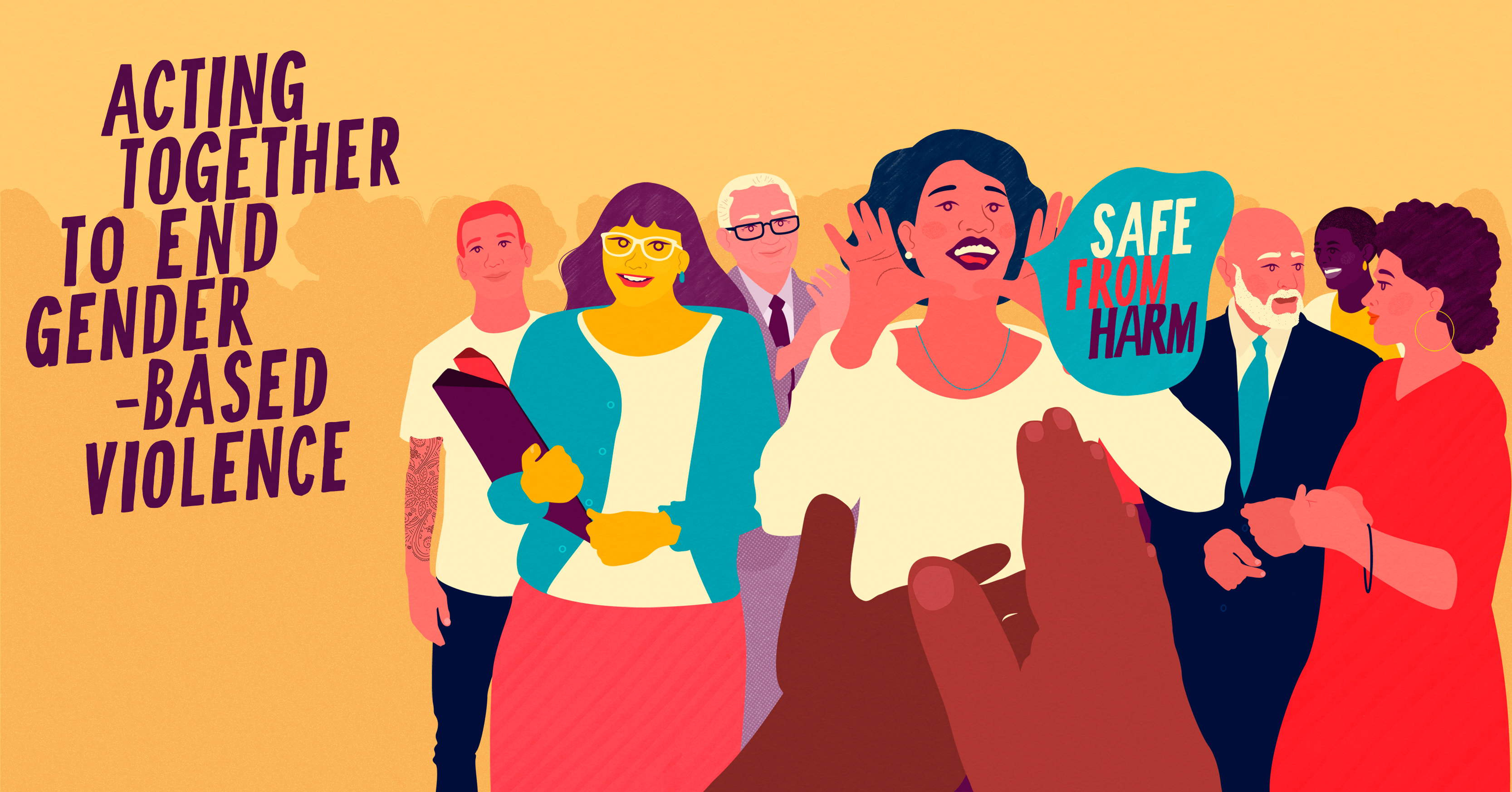
Anything less than yes is rape: the campaign for a consent-based rape law in Sweden
The absence of a ‘no’ is not an implicit yes. This is the overarching principle of a long-fought Swedish ‘consent law’ aimed at dismantling the ‘no means no’ framework; a system rooted in the idea that a person needed to explicitly resist for it to constitute rape. Women’s rights activist Demet Ergun is hopeful the law, which came into force in 2018, will facilitate understanding of consent but adds dryly that ‘People don’t pay enough attention to the fact that sex should be something done ‘with’ someone, not ‘to’ them.’ As President of the women’s rights coalition Fatta, Demet knows all too well the time-worn path to legislative change. It was Fatta that spearheaded the campaign to reform Swedish rape laws. The movement for change was sparked when the acquittal of three 19-year-old men accused of raping a 15-year-old* girl with a glass bottle in 2013 provoked mass protests. From the ashes of this horrifying rape case, feminist resistance rose up. Fed up with having women’s and girls’ experiences of sexual violence minimised by society and courts of law, the founders of what was to become Fatta began to gather together, collecting women’s stories and raising public awareness, before formally establishing the organisation. Under the new law, rape survivors no longer have to prove there was threat, force, or that they were taken advantage of in a vulnerable situation. The law states that consent can never be freely given by people who are intoxicated, incapacitated, under duress, or in a situation of unequal power dynamics or dependency, such as sex between a teacher and their student. After the law was implemented, Sweden saw rape conviction rates rise by 75% between 2019 and 2020. Four years ago, many of these cases wouldn’t legally have constituted rape; a shocking indictment of just how many survivors of sexual violence have never received justice. Gender-based violence expertise or training is still not required to be a juror in a rape trial, which Demet says must change. Sweden’s consent law also introduced a new, lesser offence of ‘negligent rape’ to make it possible to get justice for survivors in cases where courts found that while the intent to knowingly disregard the victim’s lack of consent could not be proven, the perpetrator had failed to clarify whether or not consent was being given, and therefore should have stopped and asked. The law’s acknowledgment that rape can still happen in the absence of force or threat is important to dismantling the myth that most rape is perpetrated by strangers. It also rejects the notion that prior consent is ‘forever’ consent and includes situations in which the victim ‘freezes’ or is taken by surprise and does not have time to react. Demet explains that the presumption of innocence until proven guilty hasn’t been replaced, but now the court has to decide whether or not consent was given: ‘Previously the victim had to prove that there was a strong indication of resistance. Now the accused has to show they received consent and how this was interpreted. A key difference is that physical evidence is no longer required. This is important because of the 'frozen fight' situation; often people can’t fight off perpetrators or control how their body reacts.’ Opponents of the law argue consent can’t be proven, but sexual violence campaigners insist that it can be expressed clearly either verbally or through nonverbal cues, such as positive body language like smiling, maintaining eye contact, and nodding. We have been taught that sex is about setting a silent ambiance and that talking can ‘break the mood’. However, questions can facilitate a positive sexual experience in myriad ways from creating comfort to establishing intimacy.
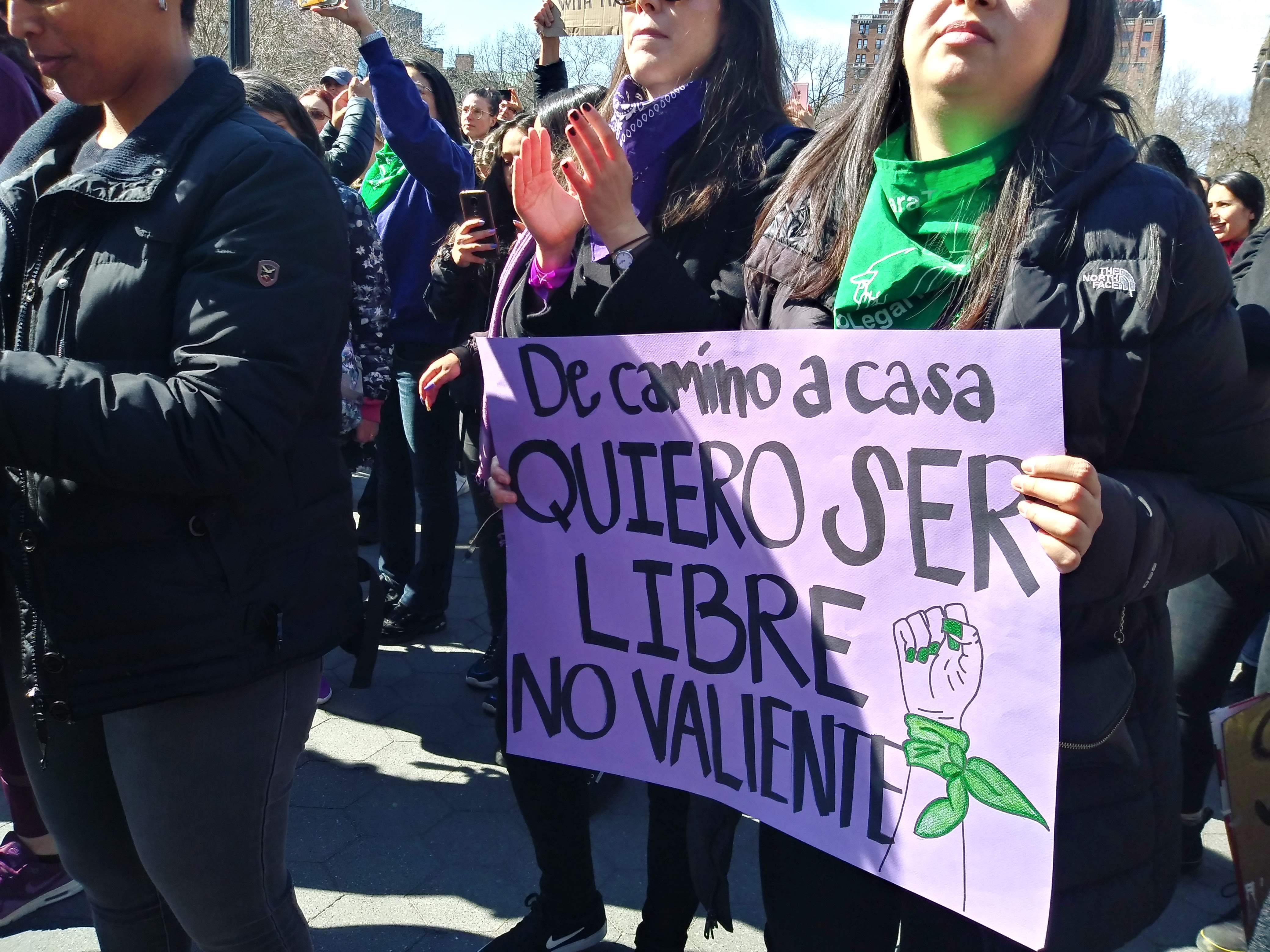
Legislating the path to consent: Spain's Yes Means Yes law
‘Everyone has the right to live without violence. You can have sex without love, but always with care’. This is the message Filomena Ruggiero wants people to take away. For her, broadening the concept of violence and placing the focus on ‘yes’ contributes to a better understanding about sex as an encounter that is wanted and not one of obligation. A long-time women’s rights champion, Filomena, who is policy adviser and advocacy lead at SEDRA-Spanish Federation for Family Planning (SEDRA-FPFE), says the collective trauma resulting from a shocking rape case in 2016 was the catalyst for change and provoked a wave of feminist action across the country. Spain’s ‘yes means yes’ consent law, which came into effect in October 2022, was sparked by the acquittal of five men who raped an 18-year-old woman during the 2016 Pamplona bull-running festival. Dubbed ‘the wolf pack’ case, there was widespread outrage after the court argued footage showing the woman motionless with her eyes closed, was proof of consent. Again, four years after the rape in Pamplona, a group of men who gang raped a 14-year-old girl in Catalonia were convicted of the lesser charge of sexual abuse, this time because the victim was intoxicated. Both cases highlighted the abject inadequacy of Spanish rape legislation, which previously stated violence or coercion had to be present for it to be considered rape. Relics of a patriarchal system, previous rape laws in Spain were steeped in sexist assumptions about consent and so-called ‘acceptable’ behaviour. Cases so often hinged on the behaviour of the victim, as if this had somehow contributed to or excused rape. What the survivor was wearing, drinking or doing at the time was put under the spotlight, and not the actions of the accused. The legal changes mean victims will no longer have to provide proof of violence or threat of violence, coercion or resistance against their attacker(s) in court. Plying someone with drugs or alcohol to coerce them into sex is a criminal offence, and digital violence, such as threats or non-consensual sharing of images, has also been criminalised. The new law maintains the presumption that the accused is innocent until proven guilty. But going forward it is the defendant who will have to prove there was consent and the victim will have to prove there was no consent. The law also aims to avoid secondary victimisation that results when institutions and individuals acting on their behalf, for example lawyers, the judiciary and the public prosecutor’s office, seek to discredit the victim by asking unnecessary and intrusive questions about her private life that are rooted in gender stereotypes and prejudices. An alliance of feminist organisations, which included SEDRA-FPFE, played an integral part in drafting the new law. They ensured the introduction of 50 crisis centres and 24-hour support for victims, as well as financial support. But Filomena says the issue now lies in resources. The national law needs to be implemented at the regional level, which means its application will be unequal. Nevertheless, the law reform sends a very clear message: nobody is entitled to your body, and consent is never given through coercion, intimidation, violence or incapacitation. Consent must now be freely given and expressed. If it is not, this is rape. Encouraging men to step up Street harassment – the provocative comments, whistling or gestures women are so often subjected to – is now also a criminal offence. This marks a paradigm shift to seeing sexual harassment as an issue of social justice. Despite this, the public outcry has galvanised the extreme right who view the reform as a threat to their regressive anti-feminist agenda. Opponents of the new law claim street harassment is part of Latin culture and something to be celebrated. Filomena rebuffs this arguing it defines women as sexual objects: ‘Catcalling is often viewed by men as something positive in Spain but the comments are of a sexual nature, which provokes insecurity and fear. It can limit women’s freedom in their choice of clothing, how they act or behave.’ Filomena believes men need to do more to end violence: ‘Social norms don’t change through laws alone but are constructed through a long cultural process. Boys and men are also victims of macho social norms. We must encourage men to stop other men from doing this and raise awareness.’ Filomena is adamant the role of men as peer educators is fundamental to the law: ‘We need to have a reflection in society on gender roles, and we cannot let macho groups distort and weaponize the debate. There is a lot of misinformation around the legislation. Male influencers should tackle this by speaking out about how this is really about putting desire at the centre, about sex being wanted and enjoyed. This would contribute to a better understanding of the law and of its consequences, which are very positive for men.’

Belgium’s consent law is clear: Absence of no doesn’t mean yes
‘Rape isn’t always something that happens when you are dragged into an alleyway’, says Heleen Heysse, Policy Officer at Sensoa, the Flemish centre of expertise on sexual health. ‘The subtle ways in which coercion can take place, as well as the many ways consent can be freely given, is within this law. It recognises people’s experiences and their trauma’. Heleen says the consent law which came into effect in June 2022 in Belgium is a victory for survivors and campaigners. The legislation unequivocally states: non-consensual sex is rape. Rape cases will now no longer hinge on whether a survivor said ‘no’ or fought back. Instead, it is an offence when consent is lacking, withdrawn or when advantage is taken of a victim’s vulnerable state. The consent-based definition also applies to other forms of sexual violence. Sensoa has been at the forefront of campaigning for reform of the outdated sexual criminal law for many years. They say that within the new law, the absence of struggle or reaction can no longer be taken as implicit consent as it takes into account the freeze response – when a person is unable to react. Heleen stresses the presumption of innocence until proven guilty remains one of the core tenets of the Belgian justice system and investigations are just as rigorous. This, she says, contradicts the myth spread by opponents of consent-based legislation that women will use the law to falsely report rape; complaints of which are grossly overestimated. Previously, an assault could only be legally considered rape if coercion, physical force or verbal threats took place, or a person was unable to defend themselves. Like in many countries across the EU, rape victims had to prove that there had been violence or that they had explicitly said ‘no.’ Alongside this law, Belgium has also become the first country in Europe to decriminalise sex work, which Heleen and her colleague Julia Day say makes it easier for sex workers to report sexual violence. Training prevents victim blaming Up to 90% of rape cases in Belgium go unreported and only 4% of people file a complaint with the police. Julia and Heleen say this is due to the hurdles survivors face when reporting sexual violence, not to mention the trauma associated with interrogations and pervasive victim blaming. Julia says adequate training is essential: ‘It’s important police know and understand the law so when conducting an interview, they have guidelines on questioning to establish whether the victim consented freely.’ Reporting a rape is a big ordeal. Victims of sexual violence often blame themselves and are afraid they won’t be believed. Even under the new law, in Belgium, when someone reports a rape to the police, the legal process is kickstarted immediately. This can discourage people from reporting sexual crimes. Fortunately, the introduction of Sexual Assault Centres has vastly reduced reporting obstacles; 68% of survivors who came to a centre went on to file a complaint, significantly higher than the national average. This is largely because the support offered at the centres is focused on providing confidential care to survivors and helping them to rebuild their lives; it includes forensic analysis, trauma care, specially trained inspectors, psychologists and case managers in one place. It also enables marginalised groups, such as transgender people and sex workers to report rape in a safer environment. Currently, there are seven centres across Belgium and Julia says they hope to have one in every province: ‘Five years ago, we had nothing. It’s a good step forward. There’s a lot that needs to be in place to open a centre. They must be linked to other hospital services, there needs to be an HIV clinic and counselling as well.’ As regards the reporting process, the centres support survivors in a way that is sensitive to the extreme stress they are experiencing, and the impact it has on the ability to process information and form memories. Victims are filmed telling their stories and can decide later on if they want to press charges or not. Heleen believes filming is vital to avoid retraumatisation: ‘It minimises how many times questions are asked, which reduces the emotional burden of the process.’ For Julia, it gives rape survivors a sense of control: ‘You get lost in the legal system with no idea what to expect and that’s scary, especially when the control has already been taken from you. When you have to repeat your story, it’s normal that it changes, and this can be used against you. Filming limits victim-blaming and puts them in a more powerful position.’

Combatting harmful gender norms through innovative education
Rigid gender norms or stereotypes limit people’s ability to pursue their professional careers and make choices about their lives. Gender norms not only limit people’s freedom and choices, but they end up condoning gender-based violence and perpetuating inequalities rooted in unbalanced power dynamics. As a result, people are coerced by collective expectations into taking up gender roles that stop them from pursuing the careers and relationships they want, or even being themselves. For example, young men are often expected to suppress their emotions so that they can conform to damaging understandings of strength and masculinity. This leaves men illequipped to express or navigate through their emotions, which can later on cause issues for their mental health. Equally, young women are often expected to be polite and accommodating to others - even in situations where they are made to feel uncomfortable. Conforming to this expectation can make it more difficult for women to assert themselves and can lead to their enduring discrimination or abuse without possessing the skills or confidence to address it. But relationship and sexuality education can play a crucial role in dismantling and challenging harmful gender norms, thus preventing gender-based violence and giving young people the skills needed to lead more equal and safe lives. Furthermore, training of adults and educators is key to raising their awareness around existing gender stereotypes that they may inadvertently perpetuate. Civil society organisations in Serbia, Estonia, Romania and Latvia came together under the Youth SpectActors project to do just that. The main purpose of the project was to educate and empower young people between 12-25 years of age to question gender norms, attitudes and stereotypes that contribute or could lead to gender-based-violence (GBV) through organising theatrical plays that deal with typical situations where gender identity and expression occur. Read about the results of our project on people's lives in the below factsheet.

Bringing people together for reproductive freedom
IPPF members are working hand-in-hand with networks of actors from within and around diverse Roma communities in Bulgaria, Romania and Serbia. The common goal: to improve access to life-changing sexual and reproductive healthcare for girls, women and young people, and tackle some of the deep rooted obstacles that prevent people - especially women and youth - from living safer and healthier lives. We are proud to share highlights of our work, recommendations to decision-makers and impact story in the below brochure.
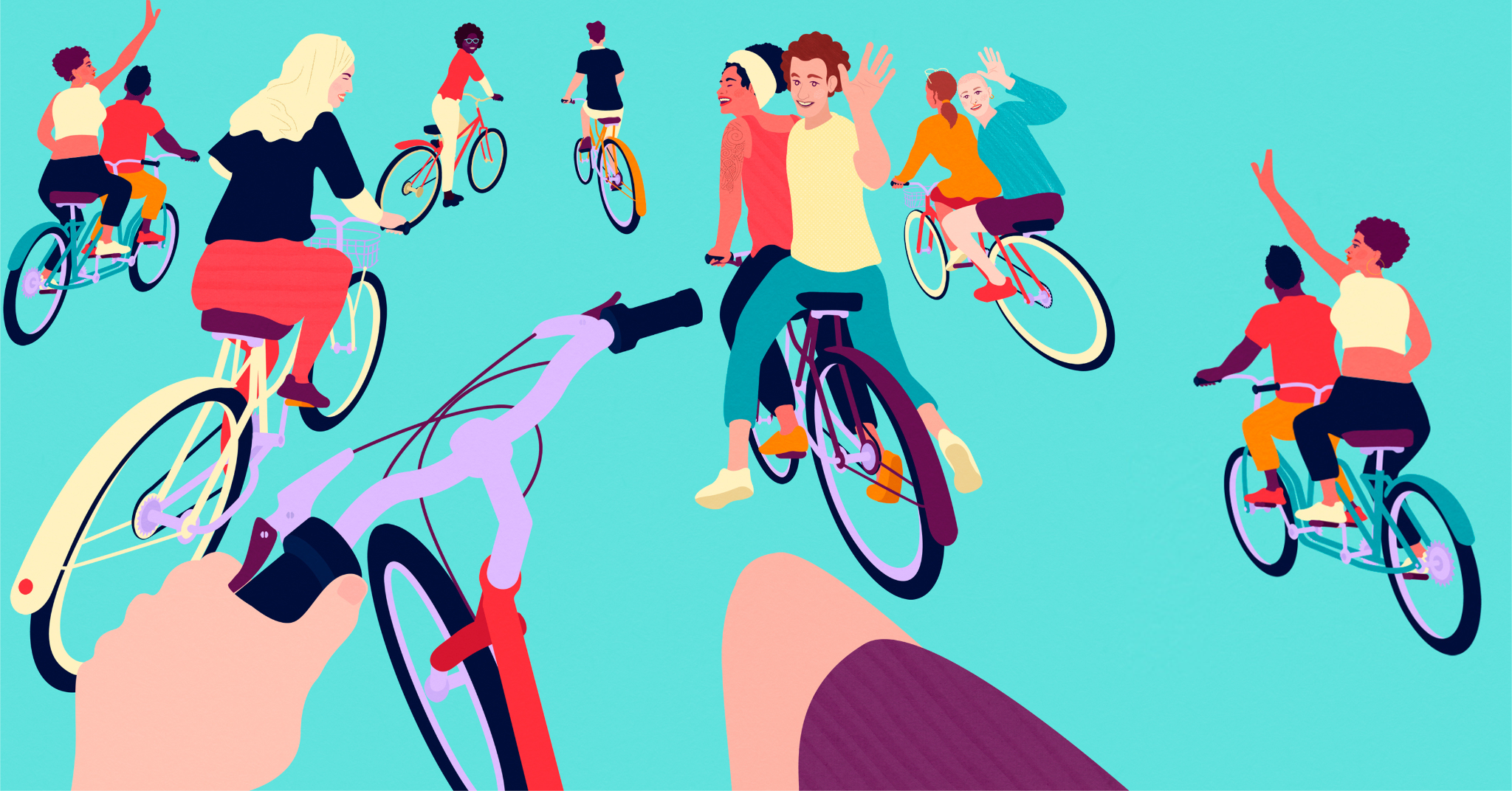
Protecting EU Rights and Values
Gender inequality and harmful gender norms remain widespread in the EU. While sexual and reproductive health and rights are at the core of gender equality and women’s rights and empowerment, their attainment varies greatly from country to country. Women and girls, particularly those marginalised by systemic oppression, face significant barriers to sexual and reproductive healthcare, information and education, which violates their human rights and hinders progress towards gender equality. Discourse from anti-rights movements continues to undermine the significant progress achieved in safeguarding SRHR and threatens many of the rights and values that the EU aims to protect. It is in this context that IPPF EN, together with its Member Associations (MAs) and partners, is working to progress towards a more gender equal world where people in all their diversity are released from harmful gender norms and fully empowered to make decisions over their lives and bodies. We are working to strengthen support in the EU institutions and Member States for gender equality and women’s rights by: Ensuring that policy and decision makers at all levels (EU, national and local) are creating progressive legislative and policy frameworks that protect and advance gender equality and women’s rights, including SRHR, within the EU; Educating and empowering young people - as a new generation of EU citizens - to become leaders and drivers of the long-term change process, rooted in societal norms and behaviours, that advances gender equality, eliminates harmful stereotypes and intersectional discrimination, and prevents SGBV; Increasing engagement and capacity of civil society actors to act in a strategic and coordinated manner when promoting gender equality and women’s rights; and Strengthening the technical and organisational capacity of our MAs and partners to design, implement and sustain intersectional, gender transformative initiatives. 2023 MAIN ACHIEVEMENTS In 2023, under the CERV programme, we collaborated with 24 EU-based IPPF MAs and collaborative partners (CPs). Our achievements in 2023 include: Supporting civil society movements by creating spaces for our MAs, CPs and other stakeholders to exchange expertise, learn from each other's experiences, engage in closer dialogue, build stronger partnerships, engage in advocacy activities and strategize more effectively and proactively against anti-rights movements. A major highlight was a four-day long programme of learning, sharing and strategizing events, organised in October in Sofia, Bulgaria. The “Power of the Many Forum” hosted over 150 SRHR activists and advocates from over 30 countries across Europe and Central Asia and included representatives from SRHR organisations, activists driving change in hostile environments, youth volunteers and community representatives bringing their expertise and lived experiences. You can download the Forum report below. Enhancing our network's strategic communications capacity, focusing on value-based framing, new narratives, research and campaigning to tackle the growing anti-gender movement. We also continued to support and stand in solidarity with brave activists, social movements and MAs championing and defending SRHR and gender equality against backlash in their national contexts, using our voice and platform to centre communities that face systemic and intersecting forms of discrimination. Continuing to drive European leadership to advance SRHR and gender equality, working with our MAs, partners and young people to champion progressive regional policies and legislation. Our external engagement helped to achieve 17 policy wins at the EU level, while our MAs and CPs achieved more than 40 wins in EU countries. Our top policy priority was supporting adoption of the landmark EU Directive to combat Violence Against Women, through direct advocacy and external communications. Continuing to equip young people with vital life skills and keep them safe from gender-based harms by further expanding the reach of a vital tool developed by IPPF EN’s young volunteers to ensure that sexuality and relationships education (SRE) tackles the root causes of gender inequality and supports prevention of SGBV, while advancing with a flagship IPPF EN initiative to contribute new evidence on how SRE can help to prevent violence. Meanwhile, in 2023, our EU-based MAs and CPs reached a total of 92,461 young people with complete CSE through their direct efforts, and this number rises to 638,679 young people with the inclusion of data from the Netherlands and Germany, where sexuality education is mandatory for young people. These combined figures reflect an approximate 23% increase in the proportion of young people MAs and CPs have managed to reach with comprehensive sexuality education compared to the previous year. You can read our Annual Report 2023 here.

Working with the Roma community and local actors for reproductive freedom
In the Balkans, IPPF members are working hand-in-hand with diverse networks of actors from within and around Roma communities. This work was shaped as the My Body, My Rights project. Our common goal is to strengthen girls’ lifelong reproductive freedom and tackle some of the deep-rooted, systemic obstacles that prevent people - especially women and youth - from living safer and healthier lives. How? By increasing access to care, creating supporting contexts for choice and advocating for investment. Our work is community-driven and based on fostering local partnerships. At the heart of this collective action are Roma volunteers, girls and boys, health mediators and local NGOs, leading grassroots change and advocating for their own unique communities. Doctors, community nurses and teachers are working with them to help deliver lasting impact. And some decision-makers are stepping up and beginning to make much-needed investments in more equitable access to reproductive healthcare. We are proud to share highlights of our work, recommendations to decision-makers and resources for further reading. Explore our new microsite!
Pagination
- Page 1
- Next page








